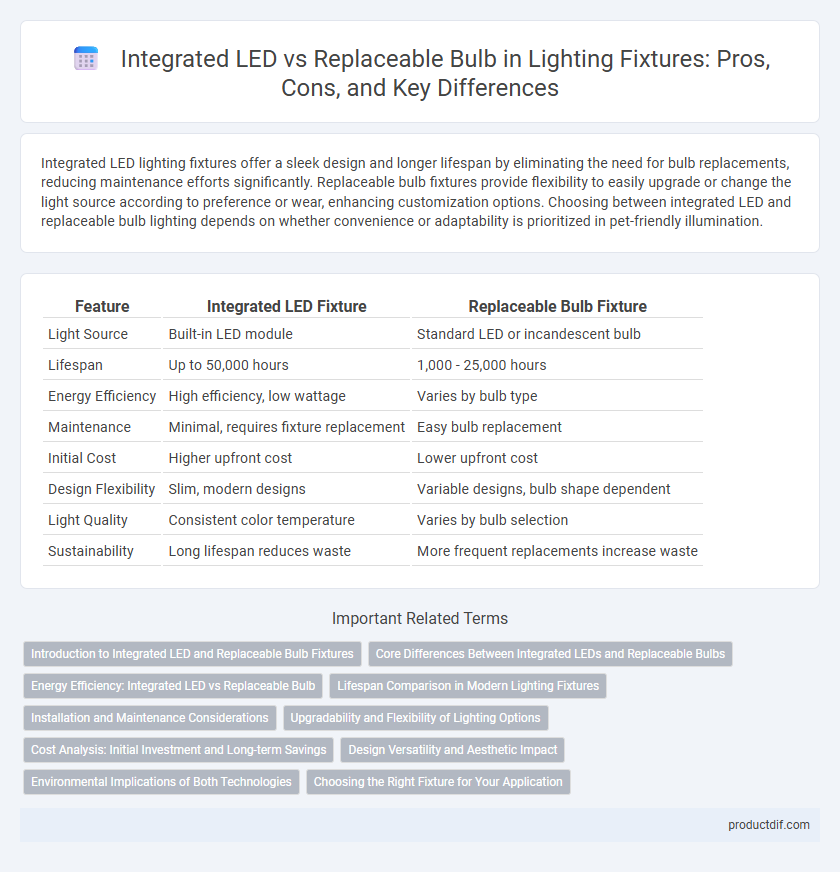Integrated LED lighting fixtures offer a sleek design and longer lifespan by eliminating the need for bulb replacements, reducing maintenance efforts significantly. Replaceable bulb fixtures provide flexibility to easily upgrade or change the light source according to preference or wear, enhancing customization options. Choosing between integrated LED and replaceable bulb lighting depends on whether convenience or adaptability is prioritized in pet-friendly illumination.
Table of Comparison
| Feature | Integrated LED Fixture | Replaceable Bulb Fixture |
|---|---|---|
| Light Source | Built-in LED module | Standard LED or incandescent bulb |
| Lifespan | Up to 50,000 hours | 1,000 - 25,000 hours |
| Energy Efficiency | High efficiency, low wattage | Varies by bulb type |
| Maintenance | Minimal, requires fixture replacement | Easy bulb replacement |
| Initial Cost | Higher upfront cost | Lower upfront cost |
| Design Flexibility | Slim, modern designs | Variable designs, bulb shape dependent |
| Light Quality | Consistent color temperature | Varies by bulb selection |
| Sustainability | Long lifespan reduces waste | More frequent replacements increase waste |
Introduction to Integrated LED and Replaceable Bulb Fixtures
Integrated LED fixtures incorporate light-emitting diodes directly into the design, offering longer lifespan and energy efficiency compared to traditional lighting. Replaceable bulb fixtures use standard sockets allowing bulbs to be swapped out, providing flexibility in light color and intensity. Choosing between integrated LED and replaceable bulb fixtures depends on maintenance preferences, energy consumption, and desired lighting customization.
Core Differences Between Integrated LEDs and Replaceable Bulbs
Integrated LED fixtures feature built-in diodes designed to last up to 50,000 hours, eliminating the need for bulb replacement and reducing maintenance costs. Replaceable bulb fixtures allow for easy swapping of bulbs, offering flexibility in light output, color temperature, and compatibility with different bulb types such as incandescent, halogen, or LED bulbs. The core difference lies in longevity and maintenance: integrated LEDs offer longer life and energy efficiency, while replaceable bulbs provide adaptability and lower upfront costs.
Energy Efficiency: Integrated LED vs Replaceable Bulb
Integrated LED lighting fixtures offer superior energy efficiency compared to replaceable bulb systems due to their advanced semiconductor technology that consumes significantly less power while delivering consistent brightness. Replaceable bulbs, such as incandescent or compact fluorescent lamps, generally have higher wattage requirements and shorter lifespans, leading to increased energy consumption and more frequent replacements. Over time, integrated LEDs reduce overall energy costs and environmental impact by maximizing lumen output per watt and minimizing waste.
Lifespan Comparison in Modern Lighting Fixtures
Integrated LED lighting fixtures offer a significantly longer lifespan, often exceeding 50,000 hours, compared to replaceable bulb fixtures which typically last between 1,000 to 25,000 hours depending on bulb type. The durability of integrated LEDs reduces maintenance frequency and replacement costs in commercial and residential applications. Advances in thermal management and driver technology further extend the operational life of integrated LED systems, making them a superior choice for long-term lighting solutions.
Installation and Maintenance Considerations
Integrated LED lighting fixtures offer streamlined installation with fewer electrical connections and no need for bulb replacement, reducing long-term maintenance efforts. Replaceable bulb fixtures require more frequent maintenance due to regular bulb changes and simpler installation but allow for easy updates to bulb technology or brightness. Choosing between these options involves balancing initial installation complexity and ongoing maintenance convenience.
Upgradability and Flexibility of Lighting Options
Integrated LED lighting fixtures offer higher energy efficiency and longer lifespan but limit upgradability since the entire unit must be replaced when the light source fails. Replaceable bulb fixtures provide greater flexibility, enabling easy upgrades to new technologies or color temperatures without replacing the entire fixture. This adaptability makes replaceable bulb designs ideal for evolving lighting needs and personalized ambiance adjustments.
Cost Analysis: Initial Investment and Long-term Savings
Integrated LED lighting fixtures generally require a higher initial investment compared to replaceable bulb systems due to advanced technology and built-in components. However, integrated LEDs offer significant long-term savings through lower energy consumption, reduced maintenance costs, and longer lifespan, often exceeding 25,000 hours. Replaceable bulb fixtures may be cheaper upfront but incur ongoing expenses from frequent bulb replacements and higher electricity usage, impacting overall cost-efficiency.
Design Versatility and Aesthetic Impact
Integrated LED lighting fixtures offer sleek, minimalist designs with seamless forms that maximize design versatility and create a modern aesthetic impact. Replaceable bulb fixtures allow for customizable light sources, enabling users to change bulb styles and colors to suit evolving decor preferences or functional needs. While integrated LEDs provide uniform light output and streamlined silhouettes, replaceable bulb designs emphasize adaptability and classic appeal.
Environmental Implications of Both Technologies
Integrated LED fixtures offer significant environmental benefits due to their energy efficiency and longer lifespan, reducing waste and lowering carbon emissions compared to replaceable bulb systems. Replaceable bulb fixtures often contribute to greater landfill waste and resource consumption, as frequent bulb replacements generate more discarded materials and require continuous manufacturing. The ability of integrated LEDs to minimize hazardous substances and reduce overall energy demand aligns with global sustainability goals and eco-friendly lighting solutions.
Choosing the Right Fixture for Your Application
Choosing the right lighting fixture depends on application requirements such as maintenance frequency and lifespan. Integrated LED fixtures offer longer durability and energy efficiency, ideal for hard-to-reach areas with minimal upkeep needs. Replaceable bulb fixtures provide flexibility for customized brightness and color changes, suitable for environments requiring periodic light adjustments or bulb replacements.
Integrated LED vs Replaceable bulb Infographic

 productdif.com
productdif.com